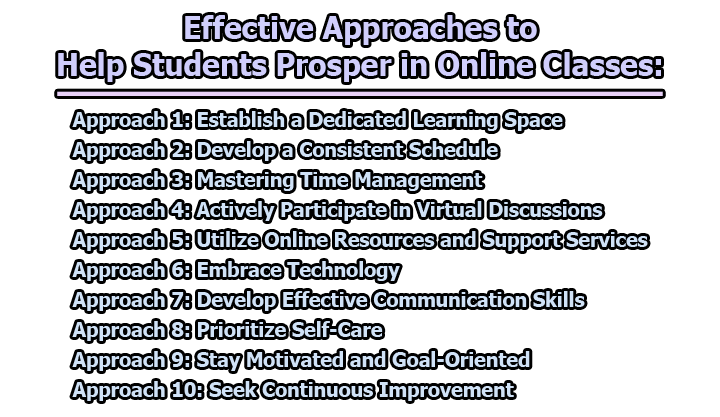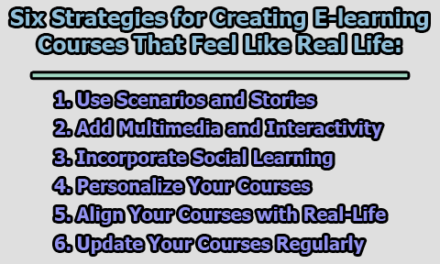Effective Approaches to Help Students Prosper in Online Classes:
The advent of online education has transformed the way we acquire knowledge, making it imperative for students to adapt and thrive in virtual classrooms. Excelling in online classes requires a unique set of skills and strategies compared to traditional brick-and-mortar institutions. In this article, we will explore some of the effective approaches to help students prosper in online classes, breaking down the process into manageable steps and providing practical tips for success.
Approach 1: Establish a Dedicated Learning Space:
Creating a conducive and dedicated learning space is a critical first step in excelling in online classes. This space should be separate from areas associated with relaxation or entertainment, allowing you to mentally transition into a focused study mode. Ideally, choose a quiet corner or room where you can avoid interruptions and distractions.
1.1 Choose an Appropriate Location: Select a location in your home that is quiet, comfortable, and free from distractions. This could be a corner of a room, a spare room, or even a well-organized study nook. Ensure that the chosen space has ample natural light and is well-ventilated to create an environment conducive to learning.
1.2 Invest in Comfortable Furniture: Consider investing in a comfortable chair and a spacious desk to create a workstation that promotes good posture and minimizes discomfort during long study sessions. Ergonomics play a crucial role in ensuring that your physical well-being is not compromised while you focus on your coursework.
1.3 Eliminate Distractions: Minimize potential distractions by keeping your learning space tidy and organized. Remove unnecessary items or clutter that might divert your attention during study sessions. Additionally, communicate with those sharing your living space to establish boundaries and ensure a quiet environment during your dedicated study hours.
1.4 Personalize Your Space: Personalizing your learning environment can create a sense of ownership and motivation. Decorate the space with inspirational quotes, artwork, or educational materials that resonate with your academic goals. Make it a space where you feel inspired and motivated to engage in learning activities.
1.5 Establish Clear Boundaries: Clearly define the boundaries of your learning space with household members or roommates. Communicate your study schedule and let them know when you need focused, uninterrupted time. This not only helps in creating a conducive environment but also fosters understanding and support from those around you.
By taking the time to thoughtfully establish a dedicated learning space, you set the foundation for a focused and productive online learning experience. This space becomes a sanctuary for academic pursuits, promoting a mindset conducive to concentration and success in your virtual classes.
Approach 2: Develop a Consistent Schedule:
Maintaining a consistent and well-organized schedule is essential for success in online classes. Unlike traditional classrooms, online learning requires a proactive approach to time management. A structured schedule not only helps in keeping track of assignments and deadlines but also fosters a sense of routine and discipline.
2.1 Create a Weekly Schedule: Start by creating a weekly schedule that includes dedicated time slots for attending virtual classes, studying, completing assignments, and other academic activities. Consider factors such as your peak productivity hours and any fixed commitments you may have, such as work or family responsibilities.
2.2 Utilize Digital Tools: Leverage digital tools such as calendars, planners, or scheduling apps to organize and manage your time effectively. These tools can send reminders for upcoming assignments, classes, and deadlines, helping you stay on top of your academic responsibilities. Many educational institutions also provide online platforms for scheduling and managing coursework.
2.3 Prioritize Important Tasks: Identify and prioritize tasks based on their importance and deadlines. Break down larger assignments into smaller, more manageable tasks, and allocate specific time slots for each. This systematic approach ensures that you make steady progress and avoid last-minute rushes.
2.4 Include Breaks and Leisure Time: Integrate short breaks into your schedule to prevent burnout and maintain focus. Use these breaks to stretch, take a walk, or engage in a brief relaxation activity. Balancing study time with leisure activities is crucial for overall well-being and sustained academic performance.
2.5 Be Adaptable and Flexible: While having a consistent schedule is important, it’s equally crucial to be adaptable and flexible. Life can be unpredictable, and unexpected events may arise. Build flexibility into your schedule to accommodate unforeseen circumstances, and be prepared to adjust your plans as needed without causing undue stress.
Developing a consistent schedule not only helps you stay organized but also cultivates good time management habits that are transferable to various aspects of life. By adhering to a well-thought-out schedule, you create a structure that supports your academic goals and contributes to a successful online learning experience.
Approach 3: Mastering Time Management:
Online classes demand a higher level of self-discipline and time management skills compared to traditional classroom settings. Effectively managing your time is crucial for meeting deadlines, staying on top of coursework, and maintaining a healthy work-life balance. Here are key strategies to master time management in the realm of online education:
3.1 Set Clear Goals and Priorities: Start each day or week by outlining your goals and priorities. Clearly define what needs to be accomplished, both in the short term and the long term. Establishing priorities helps you allocate your time and energy efficiently, focusing on tasks that contribute most significantly to your academic success.
3.2 Use a Time Tracking System: Implement a time tracking system to monitor how you spend your time. This can be as simple as keeping a log or using specialized time management apps. Analyzing your time usage allows you to identify patterns, recognize potential time-wasting activities, and make informed adjustments to enhance your efficiency.
3.3 Employ the Pomodoro Technique: The Pomodoro Technique is a popular time management method that involves breaking your study time into intervals, typically 25 minutes, separated by short breaks. After completing four intervals, take a longer break. This technique helps maintain focus, combat procrastination, and prevent mental fatigue.
3.4 Avoid Multitasking: While multitasking might seem like an efficient way to tackle multiple tasks simultaneously, it often leads to decreased productivity and quality of work. Instead, focus on one task at a time. Complete it before moving on to the next, ensuring better concentration and understanding of the material.
3.5 Create a Weekly Study Plan: Develop a detailed study plan for the week, outlining when you will attend virtual classes, study, complete assignments, and review material. Allocate specific time blocks for each task, considering the complexity and time requirements of the activities. A well-structured study plan helps you make steady progress without feeling overwhelmed.
3.6 Set Realistic Deadlines: Establish realistic deadlines for assignments and projects, considering your other commitments and the complexity of the tasks. Setting achievable deadlines prevents last-minute cramming and allows you to produce higher-quality work. Be honest with yourself about the time required for each task to avoid unnecessary stress.
3.7 Regularly Evaluate and Adjust: Periodically assess your time management strategies to determine their effectiveness. If certain methods are not yielding the desired results, be willing to adjust and experiment with alternative approaches. Flexibility and adaptability are key components of successful time management.
By mastering time management, you empower yourself to navigate the demands of online classes efficiently. Implementing these strategies not only enhances your academic performance but also equips you with valuable skills that extend beyond the virtual classroom, contributing to personal and professional success.
Approach 4: Actively Participate in Virtual Discussions:
Engaging in virtual discussions is a cornerstone of success in online classes. Unlike traditional classrooms where face-to-face interaction is prevalent, online learning relies heavily on digital communication. Actively participating in virtual discussions enhances your understanding of the subject matter, fosters a sense of community, and contributes to a richer learning experience.
4.1 Familiarize Yourself with Discussion Platforms: Get acquainted with the discussion platforms and tools used in your online courses. Common platforms include discussion forums within the Learning Management System (LMS), video conferencing tools, or collaborative document sharing platforms. Understanding how to navigate and use these tools will facilitate seamless participation.
4.2 Regularly Attend Virtual Classes: Attend virtual classes consistently and actively engage with the content being presented. Take notes, ask questions, and participate in any interactive elements offered during the session. Treating virtual classes with the same commitment as in-person classes ensures you stay connected with the material and the instructor.
4.3 Contribute Thoughtfully: When participating in virtual discussions, aim for thoughtful and constructive contributions. Share your insights, ask questions, and respond to your peers in a respectful manner. Thoughtful engagement not only enhances your own understanding but also contributes to a positive and collaborative online learning environment.
4.4 Be Proactive in Group Activities: Many online courses incorporate group projects or collaborative activities. Be proactive in forming or joining groups, and actively contribute to the shared tasks. Effective collaboration enhances your teamwork skills, exposes you to diverse perspectives, and often leads to a more comprehensive understanding of the course material.
4.5 Seek Clarification When Needed: Don’t hesitate to seek clarification from instructors or peers when you encounter challenging concepts. Use the discussion platforms to ask questions or initiate conversations about topics that require further explanation. Proactive communication demonstrates your commitment to understanding the material and contributes to a supportive online community.
4.6 Stay Informed About Course Updates: Regularly check the discussion forums or any communication channels established by your instructors for updates related to the course. Important announcements, changes in deadlines, or additional resources may be shared through these platforms. Staying informed ensures you are aware of any modifications to the course structure and can plan accordingly.
4.7 Respect Different Perspectives: Embrace the diversity of opinions and perspectives within the virtual classroom. Engage in discussions with an open mind, respecting the viewpoints of your peers. Constructive dialogue enriches the learning experience by exposing you to a variety of insights and fostering an inclusive online learning community.
Active participation in virtual discussions not only enhances your academic performance but also cultivates essential communication and collaboration skills. By embracing the interactive nature of online classes, you contribute to a dynamic learning environment that mirrors the engagement found in traditional classrooms.
Approach 5: Utilize Online Resources and Support Services:
Online classes provide access to a wealth of digital resources and support services that can significantly enhance your learning experience. Leveraging these tools and services is crucial for academic success and can help you navigate challenges more effectively. Here’s how you can make the most of the online resources available to you:
5.1 Explore Virtual Libraries and Databases: Take advantage of the digital libraries and databases provided by your institution. These resources offer a vast collection of e-books, academic journals, articles, and research materials. Familiarize yourself with the search functionalities and navigation tools to efficiently locate relevant information for your assignments and projects.
5.2 Access Online Tutorials and Learning Modules: Many online courses offer supplementary tutorials and learning modules to reinforce key concepts. Explore these resources to deepen your understanding of challenging topics or to review material covered in class. Online tutorials often include interactive elements, quizzes, and multimedia components to enhance the learning experience.
5.3 Utilize Academic Support Centers: Most educational institutions provide online academic support centers that offer tutoring services, writing assistance, and subject-specific guidance. Whether you need help with understanding course content, refining your writing skills, or seeking guidance on study strategies, these support services can be invaluable. Schedule virtual appointments or participate in online workshops to make the most of these resources.
5.4 Engage with Online Discussion Forums: Beyond course-specific discussions, online forums and communities related to your field of study can be valuable resources. Participate in relevant forums, where professionals, experts, and fellow students share insights, ask questions, and discuss industry trends. These platforms offer networking opportunities and can provide additional perspectives on the subjects you are studying.
5.5 Access Online Study Groups: Form or join online study groups with classmates to collaboratively review course material, discuss assignments, and share resources. Virtual study groups can help you stay motivated, gain different perspectives, and clarify doubts. Platforms like video conferencing or collaborative document sharing tools facilitate effective online group study sessions.
5.6 Stay Informed About Software and Tools: Depending on your course, there may be specific software or tools that are integral to your learning experience. Ensure that you are proficient in using these tools by exploring tutorials, guides, or online training resources provided by your institution. Proficiency in relevant software enhances your academic performance and prepares you for future professional applications.
5.7 Take Advantage of Online Workshops and Webinars: Many educational institutions and external organizations offer online workshops and webinars on various academic and professional topics. Attend these events to expand your knowledge, gain new skills, and stay updated on industry trends. Webinars often feature experts in the field, providing valuable insights beyond what is covered in your coursework.
By actively utilizing online resources and support services, you can enrich your learning experience, gain additional insights, and overcome challenges more effectively. A proactive approach to accessing these resources demonstrates your commitment to academic excellence and positions you for success in your online classes.
Approach 6: Embrace Technology:
Successfully navigating online classes requires a strong embrace of technology. As the primary medium of communication and learning, technology plays a pivotal role in your online education journey. Familiarizing yourself with the digital tools and platforms used in your courses will not only enhance your academic performance but also contribute to your overall technological proficiency. Here’s how to effectively embrace technology in the online learning environment:
6.1 Master the Learning Management System (LMS): The Learning Management System (LMS) is the central hub for your online courses. Invest time in becoming proficient with its features, including accessing course materials, submitting assignments, participating in discussions, and tracking your grades. Understanding how to navigate the LMS streamlines your online learning experience.
6.2 Stay Updated on Software Requirements: Online courses often require specific software applications or tools. Ensure your computer or device meets the software requirements outlined by your instructors. Keep these applications updated to prevent technical issues during virtual classes, assignments, or collaborative projects.
6.3 Improve Digital Literacy: Digital literacy is crucial for success in online classes. Enhance your digital literacy skills by familiarizing yourself with basic computer operations, file management, and online communication tools. Proficiency in word processing, spreadsheet software, and presentation tools will be valuable throughout your academic journey and in future professional endeavors.
6.4 Participate in Virtual Labs and Simulations: Some courses, especially in science and technology fields, may include virtual labs or simulations. Actively engage in these activities to reinforce theoretical concepts through practical applications. Virtual labs provide a hands-on experience, allowing you to explore and experiment in a controlled digital environment.
6.5 Explore Multimedia Learning Resources: Take advantage of multimedia learning resources, such as video lectures, podcasts, and interactive simulations. These resources cater to various learning styles and can enhance your understanding of complex topics. If your course offers recorded lectures, revisit them to reinforce key concepts and clarify any uncertainties.
6.6 Utilize Collaboration Tools: Online collaboration is a fundamental aspect of virtual learning. Familiarize yourself with collaboration tools such as Google Workspace, Microsoft Teams, or other platforms that facilitate group work, document sharing, and real-time communication. Effective use of these tools enhances teamwork and streamlines collaborative projects.
6.7 Stay Informed About Educational Apps: Explore educational apps and tools that complement your learning style and preferences. There are numerous apps designed to enhance productivity, organization, note-taking, and language learning. Experiment with different apps to discover those that align with your study habits and help you stay on top of your coursework.
6.8 Attend Technology Workshops: Many educational institutions offer workshops or training sessions on using specific technologies or software relevant to your courses. Attend these sessions to deepen your understanding and proficiency in technology. Workshops can provide valuable insights and tips that may not be covered in regular coursework.
By fully embracing technology, you empower yourself to navigate the online learning environment with confidence and efficiency. Developing strong technological skills not only supports your academic endeavors but also positions you to excel in a digitally-driven professional landscape.
Approach 7: Develop Effective Communication Skills:
Clear and effective communication is essential in online classes, where face-to-face interactions are limited. Developing strong communication skills will not only enhance your academic performance but also contribute to a positive online learning experience. Here are key strategies to foster effective communication in the virtual classroom:
7.1 Use Professional and Courteous Language: When communicating with instructors, peers, or support staff, employ professional and courteous language. Written communication, such as emails or discussion forum posts, should be clear, respectful, and free of grammatical errors. A professional tone fosters a positive online community and ensures that your messages are received as intended.
7.2 Participate Actively in Virtual Discussions: Actively engage in virtual discussions by contributing relevant insights, asking questions, and responding to your peers. Use clear and concise language to express your thoughts, and ensure your contributions add value to the discussion. Regular participation demonstrates your commitment to the course and encourages a collaborative learning environment.
7.3 Seek Clarification When Needed: If you encounter challenges or need clarification on course content, don’t hesitate to reach out to your instructors or classmates. Clearly articulate your questions and concerns, and be proactive in seeking assistance. Effective communication involves expressing your needs and actively seeking solutions.
7.4 Utilize Proper Netiquette: Adhere to proper netiquette (internet etiquette) when interacting online. This includes avoiding the use of all caps (considered shouting), refraining from offensive language, and respecting others’ opinions. Review and adhere to any specific guidelines or etiquette rules outlined by your instructors or institution for online communication.
7.5 Participate in Virtual Office Hours: Take advantage of virtual office hours provided by your instructors. This one-on-one time allows you to seek clarification, discuss course material, or address any concerns you may have. Virtual office hours provide a personalized communication channel and help build a stronger connection between you and your instructors.
7.6 Use Video Conferencing Effectively: When participating in virtual classes or meetings through video conferencing, ensure you are familiar with the platform’s features. Test your microphone and camera beforehand, dress appropriately, and maintain eye contact to create a professional atmosphere. Active engagement during video conferences fosters a sense of connection and attentiveness.
7.7 Respond Timely to Emails and Messages: Timely responses to emails and messages are crucial in online classes. Check your email regularly and respond promptly to communication from instructors or classmates. This demonstrates your commitment to effective communication and prevents misunderstandings or delays in collaborative projects.
7.8 Practice Constructive Feedback: When providing feedback on assignments or participating in peer reviews, practice constructive communication. Offer feedback in a positive and supportive manner, highlighting strengths and suggesting areas for improvement. Constructive feedback contributes to a collaborative and growth-oriented online learning environment.
Developing effective communication skills in the online learning environment is not only beneficial for academic success but also essential for future professional endeavors. As you navigate virtual discussions, assignments, and collaborative projects, honing these skills will contribute to a positive and enriching online learning experience.
Approach 8: Prioritize Self-Care:
Maintaining a healthy balance between academic responsibilities and personal well-being is paramount for long-term success in online classes. The flexibility of virtual learning comes with the responsibility of self-management, making self-care practices essential to avoid burnout and sustain a positive mindset. Here are key strategies for prioritizing self-care in the online learning environment:
8.1 Establish Boundaries Between Work and Personal Life: Clearly define boundaries between your academic and personal life. Designate specific times for studying, attending virtual classes, and completing assignments. Likewise, set aside dedicated periods for relaxation, hobbies, and spending time with family and friends. Maintaining a clear distinction between work and personal time helps prevent academic fatigue and promotes overall well-being.
8.2 Incorporate Regular Breaks: Breaks are crucial for maintaining focus and preventing mental fatigue. Integrate short breaks into your study sessions to stretch, move around, or engage in a brief relaxation activity. Stepping away from your computer or study materials periodically can reenergize your mind and enhance overall concentration.
8.3 Prioritize Physical Activity: Incorporate regular physical activity into your routine. Whether it’s a home workout, a walk, or a fitness class, exercise contributes to both physical and mental well-being. Physical activity is known to reduce stress, improve mood, and increase overall cognitive function – essential elements for effective online learning.
8.4 Ensure Adequate Sleep: Prioritize a consistent sleep schedule to ensure you get an adequate amount of rest each night. Quality sleep plays a critical role in cognitive function, memory consolidation, and overall well-being. Aim for 7-9 hours of sleep per night to support your academic performance and maintain optimal health.
8.5 Practice Mindfulness and Stress Reduction Techniques: Integrate mindfulness and stress reduction techniques into your daily routine. Techniques such as meditation, deep breathing exercises, or yoga can help manage stress levels and promote mental clarity. Mindfulness practices contribute to a positive mindset and enhance your ability to cope with the challenges of online learning.
8.6 Nourish Your Body with Healthy Nutrition: Maintain a balanced and nutritious diet to support both physical and mental health. Ensure you consume a variety of fruits, vegetables, whole grains, and lean proteins. Proper nutrition contributes to sustained energy levels, improved concentration, and overall well-being.
8.9 Stay Connected with Support Systems: Despite the virtual nature of online classes, stay connected with your support systems. Regularly communicate with family, friends, or classmates to share experiences, seek advice, or simply socialize. Building and maintaining a strong support network is crucial for emotional well-being and provides a sense of connection during online learning.
8.10 Set Realistic Goals and Celebrate Achievements: Set realistic and achievable goals for your academic and personal life. Break down larger goals into smaller, manageable tasks, and celebrate your achievements along the way. Recognizing your progress, no matter how small, contributes to a positive mindset and motivates you to continue pursuing your academic objectives.
Prioritizing self-care is not only essential for your well-being but also contributes to sustained academic success. By incorporating these strategies into your routine, you create a foundation for a balanced and fulfilling online learning experience. Remember that taking care of yourself is an integral part of achieving your academic goals.
Approach 9: Stay Motivated and Goal-Oriented:
Maintaining motivation is a crucial aspect of success in online classes, where self-discipline plays a significant role. As you navigate the virtual learning environment, staying motivated and setting clear goals will help you overcome challenges and achieve academic success. Here are strategies to foster motivation and maintain a goal-oriented approach:
9.1 Define Clear Short-Term and Long-Term Goals: Clearly define both short-term and long-term academic goals. Short-term goals may include weekly objectives, while long-term goals could encompass the entire semester or academic year. Having a clear roadmap provides direction and purpose to your studies.
9.2 Break Down Goals into Manageable Tasks: Break down larger goals into smaller, more manageable tasks. This approach prevents feelings of overwhelm and allows you to make steady progress. Focus on completing one task at a time, celebrating achievements along the way.
9.3 Create a Visual Progress Tracker: Visualizing your progress can be a powerful motivator. Create a visual tracker, such as a chart or graph, to monitor your accomplishments. This visual representation serves as a reminder of your hard work and can boost motivation during challenging times.
9.4 Establish a Reward System: Implement a reward system to incentivize your efforts. When you achieve a significant milestone or complete a challenging task, treat yourself to a small reward. This could be a break to enjoy a favorite activity, a special treat, or any other form of positive reinforcement.
9.5 Stay Connected to Your Passion for Learning: Reflect on your passion for the subject matter and the overall pursuit of knowledge. Connect your coursework to real-world applications or personal interests. Maintaining a genuine interest in what you’re learning can fuel motivation and make the educational journey more enjoyable.
9.6 Surround Yourself with Positive Reinforcement: Surround yourself with positive influences and reinforcement. Engage with classmates who share similar academic goals, join study groups, or connect with online communities related to your field of study. Positive interactions and support can contribute to a motivating and encouraging environment.
9.7 Set Realistic Expectations: Establish realistic expectations for your academic performance and workload. Understand the demands of your courses and set achievable goals that align with your capabilities. Setting unrealistic expectations can lead to frustration and a decline in motivation.
9.8 Visualize Long-Term Success: Picture your long-term success and the benefits of achieving your academic goals. Visualization techniques can enhance motivation by creating a mental image of your future accomplishments. This positive mindset encourages perseverance during challenging times.
9.9 Revisit Your Why: Revisit the reasons why you embarked on your educational journey. Whether it’s personal development, career advancement, or a passion for the subject matter, reconnecting with your initial motivations can reignite your sense of purpose and determination.
9.10 Adapt and Refine Goals as Needed: Stay flexible and be willing to adapt your goals based on your experiences and changing circumstances. Periodically reassess your objectives, adjusting them to align with your evolving priorities and aspirations. This adaptability ensures that your goals remain relevant and achievable.
Staying motivated and goal-oriented requires a proactive approach to your academic journey. By implementing these strategies, you cultivate a mindset that propels you toward success in online classes, helping you overcome challenges and celebrate your achievements along the way.
Approach 10: Seek Continuous Improvement:
Continuous improvement is a fundamental aspect of thriving in online classes. Reflecting on your learning experience, identifying areas for growth, and actively seeking ways to enhance your skills contribute to ongoing success. Embrace a mindset of continuous improvement with the following strategies:
10.1 Reflect on Your Performance: Regularly reflect on your academic performance, study habits, and overall learning experience. Consider what has worked well and areas where you can improve. Reflective practices foster self-awareness and provide insights into how you can enhance your approach to online learning.
10.2 Seek Feedback from Instructors and Peers: Actively seek feedback from instructors and peers on your assignments, projects, and contributions. Constructive feedback offers valuable insights into your strengths and areas for improvement. Use this feedback as a guide for refining your academic skills and approaches.
10.3 Participate in Professional Development Opportunities: Take advantage of professional development opportunities offered by your institution or external organizations. Webinars, workshops, and training sessions can expand your knowledge, introduce new skills, and enhance your overall academic experience. Engaging in continuous learning contributes to your personal and professional growth.
10.4 Explore Additional Learning Resources: Supplement your course materials with additional learning resources. Explore books, articles, documentaries, or online courses that delve deeper into topics covered in your classes. Diversifying your sources of information broadens your understanding and enriches your overall learning experience.
10.5 Join Online Communities and Forums: Engage with online communities and forums related to your field of study. Participate in discussions, share insights, and connect with professionals and enthusiasts in your area of interest. Online communities provide a platform for networking, staying updated on industry trends, and gaining diverse perspectives.
10.6 Take Advantage of Skill-building Opportunities: Identify specific skills that are valuable in your field of study or future career. Seek out opportunities to develop these skills through online courses, certifications, or practical projects. Skill-building enhances your academic profile and prepares you for success beyond the virtual classroom.
10.7 Establish a Growth Mindset: Cultivate a growth mindset, understanding that abilities and intelligence can be developed through dedication and hard work. Embrace challenges as opportunities for learning, and view setbacks as stepping stones toward improvement. A growth mindset fosters resilience and a positive attitude towards continuous improvement.
10.8 Set Learning Goals Beyond Course Requirements: While meeting course requirements is essential, set additional learning goals beyond the curriculum. Identify areas you are curious about or skills you want to acquire. This proactive approach to learning allows you to tailor your education to align with your interests and aspirations.
10.9 Monitor Your Progress Regularly: Regularly assess your progress toward your learning and academic goals. Periodically review your achievements, challenges, and the strategies you’ve employed. Monitoring your progress helps you stay on track, make informed adjustments, and celebrate milestones along your academic journey.
10.9 Embrace a Lifelong Learning Mindset: Adopt a mindset of lifelong learning, recognizing that education is a continuous and evolving process. Stay curious, remain open to new ideas, and seek opportunities for intellectual growth throughout your life. Embracing a lifelong learning mindset positions you for success in a rapidly changing world.
By seeking continuous improvement, you not only enhance your academic performance but also develop a mindset and skill set that serve you well in future endeavors. Embrace the journey of ongoing learning and refinement as a cornerstone of success in online classes and beyond.
In conclusion, prospering in online classes requires a proactive and adaptive approach to learning. By establishing a dedicated learning space, managing time effectively, actively participating in discussions, utilizing resources, embracing technology, developing effective communication skills, prioritizing self-care, staying motivated, and seeking continuous improvement, students can master the virtual learning environment. By incorporating these strategies into their daily routines, students can navigate the challenges of online education and emerge with a successful and fulfilling learning experience.

Library Lecturer at Nurul Amin Degree College










